Steps of an English debate
English Debate常用语(精简版)

Debate language
Ways to open a debate
In the first place we would like to state our views on this matter. We believe it is necessary to make clear that… In order to effectively debate this topic, we would like to propose…. 做出提议 What you emphasize merits / deserves closer examination. 值得更细致的研究 We will elaborate one of the most striking features of this problem, namely… 详述 The main argument focuses on…主要争论的 是…
Giving Reasons and offering explanations: To start with…, The reason why... is that…, For this reason..., That's (the reason) why..., Considering / In view of / Taking this fact into account / Allowing for the fact that… 鉴于,考 虑到
stating an opinion 陈述观点 I think/believe/suspect that..., In my opinion..., As far as I'm concerned..., 就我而言 I'd like to point out that… 我想指出的是… In / from my experience…根据我的经验… I'd like to say this:… 我会这样说… I suppose / guess..., 我猜想 I’d rather..., I’d prefer..., 我宁愿 I’m certain / pretty sure that..., 我确信 It is fairly certain that..., 确定的是…
辩论赛环节流程英语

辩论赛环节流程英语Debate Competition ProcessGood morning/afternoon everyone. Today we will be discussing the process of a debate competition.1. Opening Statements:The first step in a debate competition is the opening statements. Each team presents their position on the given topic and outlines their main arguments.开场陈述:辩论赛的第一步是开场陈述。
每个团队都会对所给话题提出自己的立场,并概述他们的主要论点。
2. Cross-Examination:After the opening statements, there is a cross-examination period where teams have the opportunity to question each other on their arguments and evidence.质询环节:在开场陈述之后,会有一个质询期,团队有机会就彼此的论点和证据进行质询。
3. Rebuttal:Following the cross-examination, each team presentstheir rebuttal where they counter the arguments made by the opposing team and strengthen their own position.反驳:在质询之后,每个团队都会进行反驳,他们会反驳对方团队提出的论点,并加强自己的立场。
4. Closing Statements:The debate competition concludes with closing statements where each team summarizes their main points and makes a final appeal to the judges.结束陈述:辩论赛以结束陈述结束,每个团队总结他们的主要论点,并向评委做最后的呼吁。
英语辩论赛辩论稿优秀9篇

英语辩论赛辩论稿优秀9篇英语辩论赛流程篇一选手及裁判在通知的时间或之前到达比赛场地,如因特殊原因不能参加,应提前告知负责人,在征得对手以及负责人的同意后可商议补赛时间。
在比赛开始15分钟后仍未到达的队伍,视为弃权,对手直接晋级;比赛于19:00正式开始。
主持人介绍规则,工作人员请选手抽签决定正反方,请评委代表抽签决定本场题目。
主持人宣布题目并开始15分钟倒计时,选手利用此15分钟进行准备,期间可以与队友自由讨论。
15分钟计时停止后,选手关闭通讯设备,主持人宣布比赛开始。
第一轮:正方一辩,反方一辩,正方二辩,反方二辩按顺序分别陈述观点,每人限时3分钟;第二轮:双方轮流攻辩,每队各有7分钟的自由发言时间,由正方开始发言。
期间可以补充之前的观点或向对方提问,对方亦可以拒绝回答,每队剩1分钟时提示一次。
当一队时间用尽则进入下一轮;第三轮:双方各派一名代表总结陈词,限时3分钟(剩半分钟时提示一次);总结陈词完毕后,选手需离开比赛场地,由评委商议比赛结果;结果商议完毕后,选手回到各自场地,评委可决定是否进行点评,点评完毕后主持人宣布比赛结果,本场比赛结束。
比赛规则初赛:根据短信报名顺序决定初赛分组,选手于比赛当日通过抽签决定正反方及辩题;复赛:初赛胜出的各组选手在比赛结束后通过抽签决定复赛对手;选手于比赛当日通过抽签决定正反方及辩题;半决赛:复赛胜出的选手在比赛结束后通过抽签决定半决赛对手,选手于比赛当日通过抽签决定正反方及辩题;半决赛胜出的两队进入总决赛,落败的两队进入三、四名争夺战;决赛当日选手通过抽签决定正反方及辩题;先进行三、四名争夺战,再进行总决赛,最后进行颁奖典礼;初赛及复赛的评委由大二学生、辅导员担任,半决赛及决赛中的评委由外教担任,评委组人数始终为单数。
比赛采用评委评议决定胜负的办法,裁决结果由评委组决定,最终解释权由学实部所有。
辩论赛辩论词篇二文章标题:辩论赛辩论词-公务用车改革的方向-货币化尊敬的主席、各位评委老师、各位辩友:公务用车,原本是为国家工作人员特别是领导干部方便工作、提高效率而配备的交通工具。
《英语辩论》-课程教学大纲
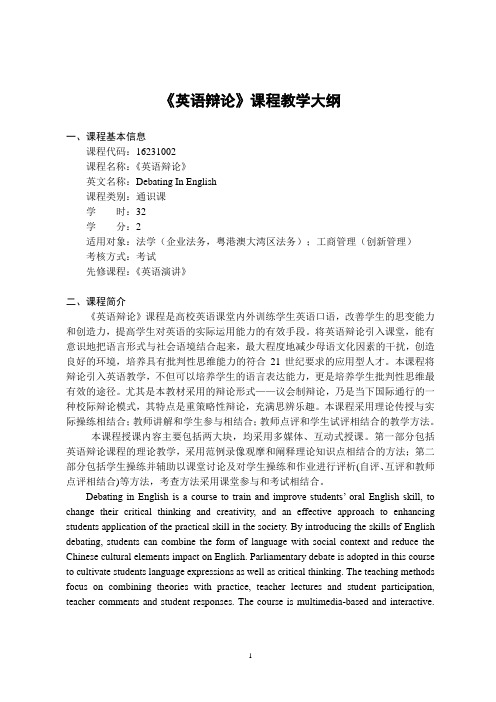
《英语辩论》课程教学大纲一、课程基本信息课程代码:16231002课程名称:《英语辩论》英文名称:Debating In English课程类别:通识课学时:32学分:2适用对象:法学(企业法务,粤港澳大湾区法务);工商管理(创新管理)考核方式:考试先修课程:《英语演讲》二、课程简介《英语辩论》课程是高校英语课堂内外训练学生英语口语,改善学生的思变能力和创造力,提高学生对英语的实际运用能力的有效手段。
将英语辩论引入课堂,能有意识地把语言形式与社会语境结合起来,最大程度地减少母语文化因素的干扰,创造良好的环境,培养具有批判性思维能力的符合21世纪要求的应用型人才。
本课程将辩论引入英语教学,不但可以培养学生的语言表达能力,更是培养学生批判性思维最有效的途径。
尤其是本教材采用的辩论形式——议会制辩论,乃是当下国际通行的一种校际辩论模式,其特点是重策略性辩论,充满思辨乐趣。
本课程采用理论传授与实际操练相结合;教师讲解和学生参与相结合;教师点评和学生试评相结合的教学方法。
本课程授课内容主要包括两大块,均采用多媒体、互动式授课。
第一部分包括英语辩论课程的理论教学,采用范例录像观摩和阐释理论知识点相结合的方法;第二部分包括学生操练并辅助以课堂讨论及对学生操练和作业进行评析(自评、互评和教师点评相结合)等方法,考查方法采用课堂参与和考试相结合。
Debating in English is a course to train and improve students’ oral English skill, to change their critical thinking and creativity, and an effective approach to enhancing students application of the practical skill in the society. By introducing the skills of English debating, students can combine the form of language with social context and reduce the Chinese cultural elements impact on English. Parliamentary debate is adopted in this course to cultivate students language expressions as well as critical thinking. The teaching methods focus on combining theories with practice, teacher lectures and student participation, teacher comments and student responses. The course is multimedia-based and interactive.The assessment emphasizes both class participation and the final exam.三、课程性质与教学目的通过本课程的学习,使学生全面、系统地掌握英语演讲和辩论的理论知识与艺术特点以及在现实交际生活的作用及在一定程度上实现相关专业与外语专业之间的复合、交融和渗透,使学生从语言的单一性向知识的多元化、宽厚型方向转化,并且提高学生综合应用英语的能力和综合素质的培养。
英语辩论技巧debate technique

English DebateHere are some recommendations on how to escape common emotionalist tactics and drive your point home.下面是一些建议,如何逃脱的共同emotionalist战术和驱动点回家。
(emotionalist [iˈməuʃənəlist] n. 易受感动者,诉诸感情的演讲人)* Using a story as an opener helps concretize your argument.*用一个故事作为起手有助于具体你的论点。
There are a great number of stories of government control and abuse, in the news, on the internet, and even in books. Draw from them to illustrate points, especially as an introduction. In telling or retelling a story, you are trying to draw the sympathy of the audience to the victim, but you are also illustrating your arguments. What you are really doing is, you are merely reminding people of what they already know : government doesn't work, individual freedom is better.有大量的消息,是政府控制和性虐待的故事,在互联网上,甚至在书本上。
从他们身上吸取点,尤其是作为引进来说明。
英语辩论赛流程及规则

英语辩论赛流程及规则Title: The Process and Rules of an English Debate CompetitionAn English debate competition is a formal discussion where two teams, typically consisting of three members each, present arguments for and against a given proposition or resolution. These competitions provide a platform for participants to showcase their critical thinking, public speaking, and persuasive skills. The process and rules of an English debate competition are crucial to ensure a fair and structured event.1. Preparation Stage:a. Topic Selection: The organizers of the debate competition will provide the topic or resolution to be debated. This topic is typically a controversial or thought-provoking issue that allows for the presentation of different perspectives.b. Team Composition: Each team consists of three members, typically referred to as the first speaker, second speaker, and third speaker. These members work collaboratively to research the topic, develop arguments, and refine their presentation.c. Research and Argument Development: Teams extensively research the topic, gather relevant information, and formulate strong arguments to support their position. They also anticipate counterarguments from the opposing team and prepare rebuttals.d. Constructing the Debate Case: The teams organize their arguments, evidence, and rebuttals into a coherent and persuasive case. They strategize the order and timing oftheir speeches to maximize the impact of their arguments.2. The Debate Format:a. Opening Statements:i. Affirmative Team (First Speaker): The first speaker of the affirmative team presents the team's position and the key arguments supporting the resolution.ii. Negative Team (First Speaker): The first speaker of the negative team outlines the team's position and the main arguments against the resolution.b. Rebuttal Speeches:i. Affirmative Team (Second Speaker): The second speaker of the affirmative team responds to the arguments presented by the negative team and reinforces the affirmative case.ii. Negative Team (Second Speaker): The second speaker of the negative team challenges the arguments made by the affirmative team and presents the negative team's counterarguments.c. Cross-Examination:i. Affirmative Team (Third Speaker): The third speaker of the affirmative team questions the negative team, aiming to expose weaknesses in their arguments or uncover inconsistencies.ii. Negative Team (Third Speaker): The third speaker of the negative team questions the affirmative team, attempting to undermine their arguments or highlight flaws in their reasoning.d. Closing Statements:i. Negative Team (Third Speaker): The third speaker of the negative team summarizes the team's key arguments and provides a final rebuttal to the affirmative team's case.ii. Affirmative Team (Third Speaker): The third speaker of the affirmative team delivers a concluding statement, reinforcing the team's position and highlighting the strengths of their arguments.3. Judging and Scoring:a. Judging Criteria: The debate is typically judged by a panel of experienced adjudicators or judges who evaluate the teams based on specific criteria, such as:i. Argumentation: The strength, logic, and coherence of the arguments presented.ii. Refutation: The ability to identify and effectively respond to the opposing team's arguments.iii. Delivery: The clarity, fluency, and persuasiveness of the speakers' presentation.iv. Teamwork: The coordination and collaboration within the team.b. Scoring System: The judges assign points to each team based on their performance, with the team that accumulates the highest score being declared the winner.4. Principles of Ethical Debating:a. Respect for the Opposition: Debaters should maintain a respectful and professional attitude towards the opposing team, avoiding personal attacks or derogatory language.b. Truthfulness and Integrity: Participants are expectedto present factual information and arguments, refraining from the use of false or misleading statements.c. Fairness and Objectivity: Judges should strive to evaluate the teams impartially, basing their decisions solely on the merits of the arguments presented.d. Sportsmanship: Participants should demonstrate good sportsmanship, accepting the outcome of the debate gracefully, regardless of the result.5. Benefits of Participating in English Debate Competitions:a. Improved Communication Skills: Debating fosters the development of effective public speaking, active listening, and persuasive communication skills.b. Critical Thinking and Problem-Solving: The process of researching, analyzing, and formulating arguments encourages critical thinking and the ability to approach complex issues from multiple perspectives.c. Intellectual Stimulation: Engaging in debates exposes participants to diverse viewpoints and challenges them to think deeply about controversial topics.d. Confidence and Leadership: Successful participation in debates can boost individuals' confidence and leadership skills, as they learn to articulate their ideas effectively and think on their feet.e. Networking and Collaboration: Debating competitions provide opportunities for participants to connect with like-minded individuals, fostering networking and collaboration.In conclusion, the process and rules of an English debate competition are designed to create a fair, structured, and intellectually stimulating environment for participants to showcase their skills and engage in meaningful discussions. By following these guidelines, debaters can develop essential communication, critical thinking, and problem-solving abilities, which can be valuable assets in various personal and professional settings.。
Debate - English Debate - Very Practical

Clarify personal position and viewpoint
Define
Clearly define your position on the topic and the main arguments you will use to support it.
Refine
Refine your position by considering potential counterarguments and addressing them in advance.
op cultivation
Analysis and evaluation
Debaters must cultivate the ability to critically analyze and evaluate arguments, identifying strengths and weaknesses, and assessing the validity and reliability of evidence.
Communicate
Practice communicating your position and arguments clearly and concisely to ensure that your message is understood by the audience.
Predict potential viewpoints of the other party and
Familiarity
Choose topics you are knowledgeable about or have a strong interest in to increase your confidence and credibility.
英文辩论流程

英文辩论流程Debate is a formal contest of argumentation between two teams or individuals. It is an important skill that can be used in various aspects of life, such as academic discussions, professional negotiations, and public speaking. In this document, we will discuss the process of an English debate, including the preparation, structure, and deliveryof arguments.1. Preparation。
Before the debate, it is essential to thoroughly research the topic and gather relevant information and evidence to support your arguments. This includes understanding the topic from different perspectives and anticipating the possible arguments that the opposing team may present. It is also important to familiarize yourself with the rules and format of the debate, including the time limits for each speech and the order of speakers.2. Structure。
英文辩论赛作业流程

英文辩论赛作业流程In an English debate competition, preparation is key. Whether you're a seasoned debater or just starting out, having a solid process in place can make all the difference. Here's a step-by-step guide to help you navigate the intricacies of preparing for an English debate:1. Understanding the Topic: The first step in any debate is to thoroughly understand the topic at hand. Take the time to read and analyze the topic statement or resolution. Identify key terms and concepts that will frame your argument.2. Researching the Issue: Once you understand the topic, it's time to dive into research. Look for credible sources of information, such as academic journals, reputable news outlets, and expert opinions. Take notes on key arguments, evidence, and examples that support your position.3. Formulating Arguments: Based on your research, begin formulating your arguments. Develop clear, concise points that support your stance on the topic. Anticipate counterarguments and think critically about how to refute them effectively.4. Building a Case Structure: Organize your arguments into a coherent case structure. Typically, a debate case will consist of an opening statement, followed by several supporting arguments and a conclusion. Make sure each argument flows logically from the previous one and contributes to your overall position.5. Gathering Evidence: To strengthen your arguments, gather supporting evidence from your research. This could include statistics, expert opinions, case studies, and historical examples. Be sure to cite your sources accurately and use evidence that is relevant and up-to-date.6. Preparing Rebuttals: In debate, it's essential to anticipate opposing arguments and prepare rebuttals in advance. Consider potential counterarguments and develop responses that undermine their validity. Use logic, evidence, and reasoning to deconstruct opposing points effectively.7. Practicing Delivery: Once you have your arguments prepared, practice delivering them with confidence and conviction. Pay attention to your tone, pacing, and body language to ensure effective communication. Consider recording yourself or practicing in front of a mirror to fine-tune your delivery.8. Mock Debates: Finally, participate in mock debates to put your skills to the test. Engage with peers or mentors who can provide constructive feedback on your arguments and delivery. Use these opportunities to refine your approach and address any weaknesses before the actual competition.By following these steps, you can effectively prepare for an English debate competition and increase your chances of success. Remember to stay informed, articulate, and adaptable in your approach, and don't forget to enjoy the process of intellectual engagement and exchange.。
为英语辩论做准备作文
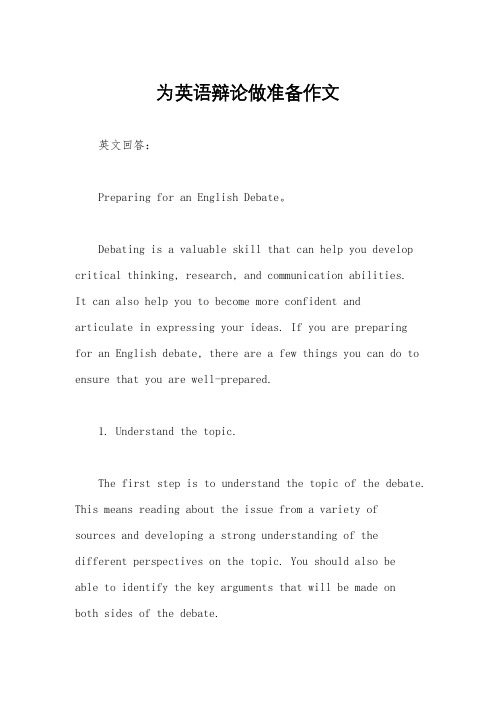
为英语辩论做准备作文英文回答:Preparing for an English Debate。
Debating is a valuable skill that can help you develop critical thinking, research, and communication abilities.It can also help you to become more confident andarticulate in expressing your ideas. If you are preparingfor an English debate, there are a few things you can do to ensure that you are well-prepared.1. Understand the topic.The first step is to understand the topic of the debate. This means reading about the issue from a variety ofsources and developing a strong understanding of thedifferent perspectives on the topic. You should also beable to identify the key arguments that will be made onboth sides of the debate.2. Research your evidence.Once you understand the topic, you need to research your evidence. This means finding credible sources that support your position on the topic. You should also be able to anticipate the evidence that the opposing side will present and be prepared to counter it.3. Develop your arguments.Once you have your evidence, you need to develop your arguments. Your arguments should be clear, concise, and supported by evidence. You should also be able toanticipate the counterarguments that the opposing side will make and be prepared to respond to them.4. Practice your delivery.Once you have developed your arguments, you need to practice your delivery. This means practicing speaking clearly and confidently, and being able to answer questionsfrom the audience. You should also be prepared to handle interruptions and heckling from the opposing side.5. Be confident.On the day of the debate, it is important to be confident. This means believing in your arguments and being able to express them clearly and persuasively. You should also be prepared to handle any challenges that the opposing side may make.中文回答:为英语辩论做准备。
外研社英语辩论赛流程及规则

外研社英语辩论赛流程及规则The English Debate Competition Hosted by the Foreign Language Teaching and Research Press: Procedures and RulesThe Foreign Language Teaching and Research Press (FLTRP) is a renowned educational publishing house in China that has been actively promoting the development of English language education in the country. One of their flagship initiatives is the annual English Debate Competition, which has become a highly anticipated event for students and schools across the nation. This competition provides a platform for students to showcase their English language proficiency, critical thinking skills, and public speaking abilities. In this essay, we will delve into the procedures and rules governing this prestigious competition.The FLTRP English Debate Competition is open to secondary school students from all over China. The competition is structured in a way that allows participants to engage in lively and thought-provoking discussions on a variety of topics. The competition typically consists of several rounds, each with its own set of guidelines and requirements.The first round of the competition is the preliminary round, where teams of two to three students compete against each other. In this round, teams are given a motion, which is a statement or proposition that they must either support or oppose. Teams are given a limited amount of time, usually around 30 minutes, to prepare their arguments and strategies. During the debate, each team member takes on a specific role, such as the opening speaker, the rebuttal speaker, or the closing speaker.The preliminary round is designed to assess the teams' ability to research, analyze, and articulate their arguments effectively. The judges, who are typically experienced educators or debate coaches, evaluate the teams based on criteria such as the strength of their arguments, the clarity of their communication, and their ability to respond to the opposing team's points.The teams that emerge victorious from the preliminary round move on to the semi-final round. In this round, the level of competition intensifies, as the teams are now required to engage in a more complex and nuanced debate. The motions in the semi-final round are often more challenging and thought-provoking, requiring the teams to delve deeper into the issues and consider multiple perspectives.During the semi-final round, the teams are given more time toprepare, usually around 45 minutes. This allows them to conduct more extensive research, develop more sophisticated arguments, and anticipate potential counterarguments from their opponents. The judges in this round are typically more experienced and knowledgeable, and they evaluate the teams based on a more comprehensive set of criteria.The teams that excel in the semi-final round then advance to the grand final, which is the culmination of the FLTRP English Debate Competition. This final round is a highly anticipated event, with the winning teams receiving prestigious awards and recognition. The grand final is typically held in a larger venue, with a larger audience in attendance, including parents, teachers, and distinguished guests.In the grand final, the teams are given even more time to prepare, usually around 60 minutes. The motion for the final round is often the most challenging and thought-provoking of the entire competition. The teams are expected to demonstrate their mastery of the English language, their ability to think critically and strategically, and their capacity to engage in a lively and engaging debate.The judges in the grand final are the most experienced and respected individuals in the field of English language education and debate. They evaluate the teams based on a comprehensive set ofcriteria, including the quality of their arguments, the clarity and coherence of their communication, their ability to respond to the opposing team's points, and their overall performance and stage presence.The FLTRP English Debate Competition is not just a showcase of academic excellence; it is also an opportunity for students to develop valuable life skills. Through the process of preparing for and participating in the competition, students learn how to research and analyze complex issues, how to structure and present their arguments effectively, and how to think critically and respond to opposing viewpoints.Moreover, the competition fosters a sense of camaraderie and teamwork among the participants, as they work together to develop their strategies and support one another throughout the various rounds. This experience can be particularly valuable for students as they navigate the challenges of their academic and personal lives.In conclusion, the FLTRP English Debate Competition is a highly prestigious and well-organized event that provides a platform for secondary school students to showcase their English language proficiency and critical thinking skills. The competition's rigorous procedures and well-defined rules ensure that the participants are evaluated fairly and that the winners are truly deserving of theaccolades they receive. By participating in this competition, students not only have the opportunity to demonstrate their academic prowess but also to develop valuable life skills that will serve them well in their future endeavors.。
为英语辩论做准备作文
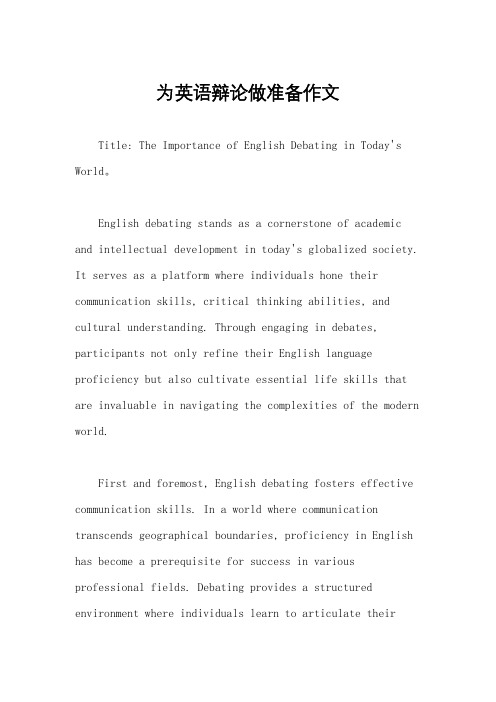
为英语辩论做准备作文Title: The Importance of English Debating in Today's World。
English debating stands as a cornerstone of academic and intellectual development in today's globalized society. It serves as a platform where individuals hone their communication skills, critical thinking abilities, and cultural understanding. Through engaging in debates, participants not only refine their English language proficiency but also cultivate essential life skills that are invaluable in navigating the complexities of the modern world.First and foremost, English debating fosters effective communication skills. In a world where communication transcends geographical boundaries, proficiency in English has become a prerequisite for success in various professional fields. Debating provides a structured environment where individuals learn to articulate theirthoughts coherently, express ideas persuasively, and engage in constructive dialogue. These communication skills are transferable to diverse settings, including academic pursuits, career endeavors, and interpersonal relationships.Furthermore, debating cultivates critical thinking and analytical abilities. Participants are tasked with researching complex topics, evaluating evidence, and formulating logical arguments. Through this process, they develop the capacity to think critically, question assumptions, and challenge prevailing notions. In an era inundated with misinformation and polarization, the ability to analyze information critically is indispensable. English debating equips individuals with the tools to navigate the vast sea of information, discern truth from falsehood, and make informed decisions.Moreover, English debating promotes cultural understanding and empathy. Debaters engage with a diverse array of perspectives, ideologies, and worldviews, thereby broadening their horizons and fostering empathy towards others. By stepping into the shoes of their opponents,debaters gain insight into different cultural norms, values, and experiences. This cross-cultural exchange not only enhances mutual respect and tolerance but also fosters a more interconnected and harmonious global community.In addition, English debating enhances confidence and resilience. Standing before an audience, articulating one's arguments, and defending one's position require courage and self-assurance. Through repeated practice and constructive feedback, debaters overcome stage fright, hone their public speaking skills, and develop resilience in the face of adversity. These qualities are not only essential for success in debating but also for navigating the challengesof everyday life with confidence and poise.Furthermore, English debating nurtures leadership and teamwork skills. Debaters collaborate with teammates to formulate cohesive arguments, rebut opposing points, and strategize effectively. In the process, they learn to communicate collaboratively, delegate tasks, and leverage each other's strengths. These teamwork skills areinvaluable in professional settings, where success oftenhinges on the ability to collaborate effectively with others towards a common goal.In conclusion, English debating plays a vital role in shaping well-rounded individuals equipped to thrive in the complexities of the 21st century. By honing communication skills, fostering critical thinking, promoting cultural understanding, enhancing confidence, and nurturing leadership abilities, debating empowers individuals to navigate the globalized world with competence and empathy. As we confront an increasingly interconnected and interdependent world, the importance of English debating in fostering intellectual growth, cross-cultural exchange, and constructive dialogue cannot be overstated. It is not merely a competition but a transformative journey towards personal and societal enrichment.。
学英语的流程

学英语的流程Learning English is a process that requires time, dedication, and consistent practice. There are several steps to follow in order to effectively learn the language.First, it's important to establish a strong foundationin the basics of English. This includes learning the alphabet, basic grammar rules, and essential vocabulary. A good way to start is by enrolling in an English language course or finding a reputable language learning app or website.Once the basics are in place, it's crucial to practice speaking and listening to English as much as possible. This can be done by engaging in conversations with native English speakers, watching English movies and TV shows, and listening to English music and podcasts. Immersing oneself in the language is key to improving fluency and comprehension.In addition to speaking and listening, reading and writing in English are also essential skills to develop. Reading English books, newspapers, and articles can helpexpand vocabulary and improve reading comprehension. Writing in English, whether it's through journaling, sending emails, or writing essays, can help reinforce grammar and sentence structure.Another important aspect of learning English is to seek feedback and correction from others. This can be done by joining a language exchange group, hiring a tutor, or participating in language learning forums. Constructive feedback is invaluable in identifying and correcting mistakes.Furthermore, setting specific, achievable goals is crucial in the learning process. Whether it's aiming to pass a language proficiency exam, having a conversation with a native speaker, or simply improving overall language skills, having clear goals can provide motivation and direction.Finally, it's important to stay consistent and patient throughout the learning process. Learning a new language takes time and effort, and it's normal to encounter challenges and setbacks along the way. By staying dedicated and practicing regularly, progress will inevitably be made.学习英语是一个需要时间、专注和持续练习的过程。
辩论赛准备英语作文

辩论赛准备英语作文Preparing for a debate competition can be an exciting and challenging experience. It requires meticulous planning, in-depth research, and a strong understanding of the topicat hand. Here are some tips to help you prepare for adebate competition.1. Understand the debate format.Before you start preparing, it's important to understand the format of the debate competition you're entering. Different competitions may have different rules and requirements, so make sure you're familiar with the specifics of the event you're participating in. This will help you plan your strategy and ensure you're ready for anything that comes your way.2. Choose your topic.Once you understand the format, the next step is tochoose a topic. Choose a topic that you're passionate about and that you feel strongly about. This will help you stay engaged and motivated throughout the preparation process. Make sure your topic is also relevant and has the potential to generate meaningful discussion.3. Research and gather evidence.Once you've chosen your topic, it's time to start researching. Gather as much information as possible about both sides of the argument. Look for credible sources, such as academic journals, newspapers, and government reports.It's also important to consider counterarguments and be prepared to defend your position against opposing viewpoints.4. Develop your argument.With your research in hand, it's time to start developing your argument. Start by identifying the main points you want to make and organize them into a logical structure. Make sure your argument is clear, concise, andpersuasive. Practice delivering your argument out loud to ensure it flows naturally and is easy to understand.5. Prepare for rebuttals.In a debate, you can expect to face rebuttals from your opponents. Prepare for these by anticipating what they might say and developing responses in advance. Think about how you can effectively counter their arguments and provide compelling evidence to support your own position.6. Practice and refine.Practice is essential when preparing for a debate competition. Practice delivering your argument, responding to rebuttals, and asking questions. Record yourself and watch back your performances to identify areas where you can improve. Refine your arguments and delivery style until you feel confident and prepared.7. Stay calm and confident.On the day of the competition, it's important to stay calm and confident. Remember all the hard work you've put in and trust in your preparation. Listen carefully to your opponents and respond thoughtfully. Use your voice and body language to convey confidence and authority.8. Reflect and learn.After the competition, take some time to reflect on your performance. Identify areas where you did well and where you could improve. Use this feedback to inform your future debate preparations and become a more effective debater.In conclusion, preparing for a debate competition requires a combination of hard work, strategic planning, and confident execution. By following these tips andputting in the necessary effort, you can increase your chances of success and enjoy a rewarding experience.。
英语作文四步法

英语作文四步法The Four Steps of Writing an English Essay。
Writing an English essay can be a challenging task, especially if you are not familiar with the proper structure and techniques. However, by following the four steps of writing, you can effectively organize your thoughts and ideas, resulting in a well-written and coherent essay. In this document, we will explore these four steps and provide useful tips to help you improve your essay writing skills.Step 1: Preparing and Planning。
Before you start writing your essay, it is crucial to spend some time preparing and planning. This step involves understanding the essay prompt or topic, conducting research, and brainstorming ideas. Begin by carefully reading the prompt and highlighting the key points or keywords. This will help you focus your research and ensure that your essay addresses the specific requirements.Next, conduct thorough research on the topic. Utilize reliable sources such as books, academic journals, and reputable websites to gather relevant information. Take notes and organize your findings to make it easier to refer to later. Remember to record the sources you use for proper citation.After gathering information, it is time to brainstorm ideas. Write down all the possible points and arguments related to the topic. This will help you create an outline and structure for your essay. Organize your ideas into main points and supporting details, ensuring a logical flow of thoughts.Step 2: Writing the Introduction。
学会英语的关键一步作文

学会英语的关键一步作文Learning English is an exciting journey that can open up a world of opportunities. Here's an essay on a crucial step in mastering the English language.The Pivotal Step in Learning EnglishMastering a new language is a complex process that requires dedication, practice, and the right approach. When it comesto learning English, one step stands out as particularly pivotal: the development of a strong foundation in the basics.Understanding the BasicsThe foundation of any language is built upon its grammar, vocabulary, and pronunciation. In English, this meansstarting with simple sentence structures, expanding your lexicon with common words, and practicing the phonetics to improve enunciation.Grammar as a CornerstoneGrammar is the backbone of any language. It provides therules that dictate how words are used to create meaningful sentences. For English learners, it's essential to grasp tenses, articles, prepositions, and the various parts ofspeech. This understanding serves as a guide for constructing sentences that are both grammatically correct andcontextually appropriate.Building a Robust VocabularyVocabulary is the lifeblood of language. Without a wide range of words at your disposal, communication can be limited and less effective. English learners should aim to learn new words daily, focusing on those that are most relevant totheir interests and needs. Using flashcards, word lists, and language apps can be an effective way to expand one's vocabulary.Pronunciation MasteryPronunciation can be a significant barrier for English learners. English is known for its irregularities and exceptions to pronunciation rules. To overcome this, learners should listen to native speakers, repeat words and phrases aloud, and consider using a pronunciation guide or taking speech classes to refine their skills.Immersion and PracticeOnce the basics are in place, the next pivotal step is to immerse oneself in the language. This can be done through various means, such as watching English-language films, reading books, engaging in conversations, and traveling to English-speaking countries. The more one exposes themselves to the language, the more opportunities they have to practiceand refine their skills.Consistent PracticeConsistency is key in language learning. Regular practice, even if it's just a few minutes a day, can lead tosignificant progress over time. Learners should set asidetime each day to review and apply what they've learned, whether it's through writing, speaking, or listening exercises.Seeking FeedbackFinally, one of the most important steps in learning Englishis to seek feedback. This can come from teachers, language exchange partners, or even online communities. Constructive criticism is invaluable for identifying areas that need improvement and for reinforcing good habits.In conclusion, the key to learning English lies in a solid foundation of grammar, vocabulary, and pronunciation,followed by consistent practice and immersion in the language. By taking these steps seriously and seeking out opportunities for feedback and improvement, English learners can make significant strides towards fluency.。
初中生英语演讲的正确步骤与技巧
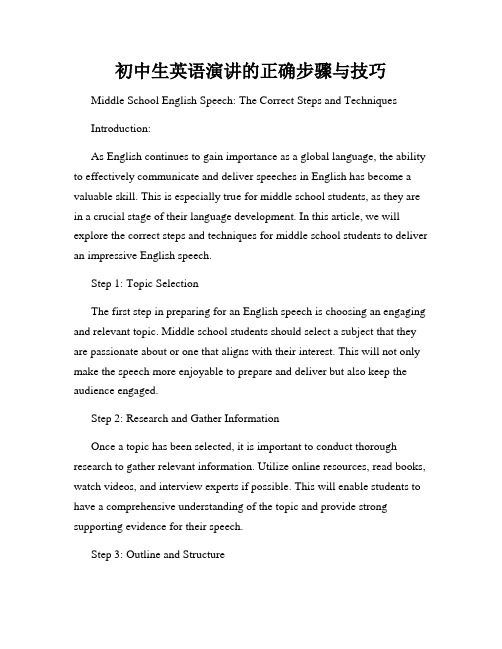
初中生英语演讲的正确步骤与技巧Middle School English Speech: The Correct Steps and TechniquesIntroduction:As English continues to gain importance as a global language, the ability to effectively communicate and deliver speeches in English has become a valuable skill. This is especially true for middle school students, as they are in a crucial stage of their language development. In this article, we will explore the correct steps and techniques for middle school students to deliver an impressive English speech.Step 1: Topic SelectionThe first step in preparing for an English speech is choosing an engaging and relevant topic. Middle school students should select a subject that they are passionate about or one that aligns with their interest. This will not only make the speech more enjoyable to prepare and deliver but also keep the audience engaged.Step 2: Research and Gather InformationOnce a topic has been selected, it is important to conduct thorough research to gather relevant information. Utilize online resources, read books, watch videos, and interview experts if possible. This will enable students to have a comprehensive understanding of the topic and provide strong supporting evidence for their speech.Step 3: Outline and StructureCreating an outline is an essential step in organizing thoughts and ideas. Middle school students should divide their speech into three main sections: introduction, body, and conclusion. The introduction should grab the audience's attention, introduce the topic, and clearly state the main idea or thesis statement. The body should consist of well-structured paragraphs, each addressing a separate point with supporting evidence. Finally, in the conclusion, students should summarize their main points and leave the audience with a lasting impression.Step 4: Practice, Practice, PracticeThe saying "practice makes perfect" is particularly applicable when it comes to delivering speeches. Middle school students should rehearse their speech multiple times, focusing on their tone, pronunciation, and body language. They should familiarize themselves with the content to ensure a confident and smooth delivery.Step 5: Engaging Introductions and ConclusionsThe introduction and conclusion are crucial parts of any speech. Middle school students should strive to make their introductions engaging by using a captivating story, a thought-provoking question, or an interesting fact related to their topic. Likewise, the conclusion should leave a lasting impact on the audience by summarizing the main points and offering a call to action, a personal reflection, or a powerful quote.Step 6: Vocal Variety and Body LanguageTo captivate the audience, middle school students should work on their vocal variety and body language. Using different tones, emphasis, andinflections can add depth and interest to their speech. Additionally, maintaining eye contact, using hand gestures, and having good posture can enhance the overall delivery and engage the audience.Step 7: Visual Aids and TechnologyIncorporating visual aids or technology can significantly enhance the effectiveness of an English speech. Middle school students can utilize PowerPoint presentations, videos, images, or props to support their main points and engage the audience visually. However, it is crucial to ensure that the visual aids are clear and well-prepared to avoid distractions.Step 8: Time ManagementAn essential aspect of delivering a successful speech is effectively managing time. Middle school students should practice their speech multiple times to ensure they can complete it within the allocated time frame. Timing techniques such as using an analog clock or practicing with a stopwatch can help maintain a consistent pace throughout the speech.Step 9: Overcoming NervousnessNervousness is common when delivering speeches, especially for middle school students. To overcome this, it is crucial to practice regularly and to imagine a positive outcome. Deep breathing techniques, positive self-talk, and visualizing confident delivery can also help alleviate anxiety.Conclusion:Mastering the art of delivering an impressive English speech is a valuable skill that can greatly benefit middle school students. By followingthe correct steps of topic selection, research, outlining, practice, engaging introductions and conclusions, vocal variety and body language, visual aids and technology, time management, and overcoming nervousness, students can confidently communicate their ideas and captivate their audience. With continued practice and determination, middle school students can develop excellent public speaking skills that will serve them well throughout their lives.。
英文辩论赛流程:Englishdebate
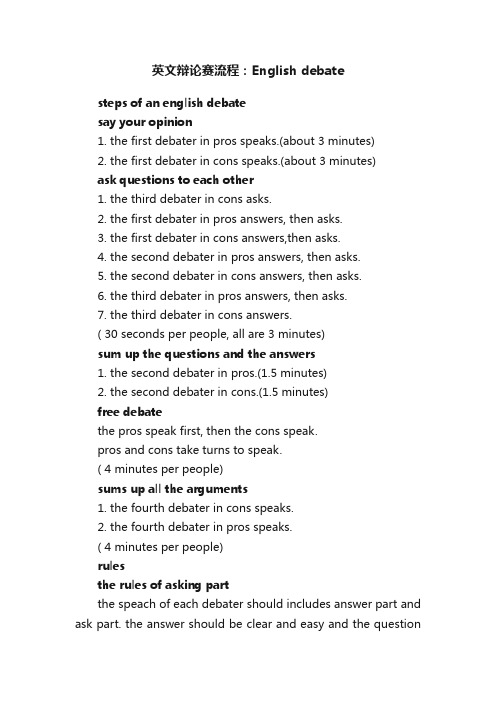
英文辩论赛流程:English debatesteps of an english debatesay your opinion1. the first debater in pros speaks.(about 3 minutes)2. the first debater in cons speaks.(about 3 minutes)ask questions to each other1. the third debater in cons asks.2. the first debater in pros answers, then asks.3. the first debater in cons answers,then asks.4. the second debater in pros answers, then asks.5. the second debater in cons answers, then asks.6. the third debater in pros answers, then asks.7. the third debater in cons answers.( 30 seconds per people, all are 3 minutes)sum up the questions and the answers1. the second debater in pros.(1.5 minutes)2. the second debater in cons.(1.5 minutes)free debatethe pros speak first, then the cons speak.pros and cons take turns to speak.( 4 minutes per people)sums up all the arguments1. the fourth debater in cons speaks.2. the fourth debater in pros speaks.( 4 minutes per people)rulesthe rules of asking partthe speach of each debater should includes answer part and ask part. the answer should be clear and easy and the questionalso should be clear.( only one question each time)the rules of free debate1. free debate should be around two teams.a debater in pros speaks first then a debater in cons speaks. two teams take turns, until the time is up.2. the time that each team takes should be calculated the total time. when one team end the speaking, we begin to record the time of the other team.3. in the total time. it doesn't matter that how long and how many times a debater speak.4. if one of the teams uses out the time, the other team can give up speaking or keep on taking turns until the time is up. giving up speaking cannot influence the score.during the debate, debaters cannot read the imformation that is prepared before. but they can show the summary of any newspaper or book.during the debate, debaters cannot leave sets. they also cannot stop the speaking of the other side debater or their side debater.。
英文辩论赛流程
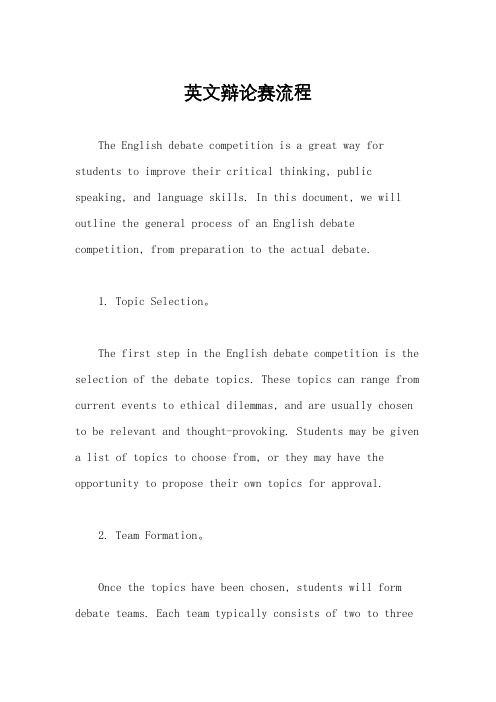
英文辩论赛流程The English debate competition is a great way for students to improve their critical thinking, public speaking, and language skills. In this document, we will outline the general process of an English debate competition, from preparation to the actual debate.1. Topic Selection。
The first step in the English debate competition is the selection of the debate topics. These topics can range from current events to ethical dilemmas, and are usually chosen to be relevant and thought-provoking. Students may be given a list of topics to choose from, or they may have the opportunity to propose their own topics for approval.2. Team Formation。
Once the topics have been chosen, students will form debate teams. Each team typically consists of two to threemembers, with one member designated as the lead speaker. It is important for the team members to work together cohesively and to allocate specific roles and responsibilities for each member.3. Research and Preparation。
debate英语辩论非常实用哟

The Benefits of a Debate
• develop positive attitudes toward the intellectual exchange of ideas
• develop an interest in the investigation of issues and problems
English For Debate
What is a Debate?
• A debate is a form of argument. It contains two teams arguing opposite sides of a “proposition” in an orderly manner, following the agreed upon rules.
• the structure to order your thoughts, to introduce, develop and summarize your points.
• the general and specific knowledge of many current affairs topics, learnt through research and debate.
• the flexibility to react quickly to new ideas, and to remain unflustered in crises.
Preparing for a debate, you should learn …
• to use a library, and to find the exact information you need in the shortest possible time.
- 1、下载文档前请自行甄别文档内容的完整性,平台不提供额外的编辑、内容补充、找答案等附加服务。
- 2、"仅部分预览"的文档,不可在线预览部分如存在完整性等问题,可反馈申请退款(可完整预览的文档不适用该条件!)。
- 3、如文档侵犯您的权益,请联系客服反馈,我们会尽快为您处理(人工客服工作时间:9:00-18:30)。
Steps of an English debate
say your opinion
1. The first debater in pros speaks.(about 3 minutes)
2. The first debater in cons speaks.(about 3 minutes)
ask questions to each other
1. The third debater in cons asks.
2. The first debater in pros answers, then asks.
3. The first debater in cons answers,then asks.
4. The second debater in pros answers, then asks.
5. The second debater in cons answers, then asks.
6. The third debater in pros answers, then asks.
7. The third debater in cons answers.
( 30 seconds per people, all are 3 minutes)
sum up the questions and the answers
1. The second debater in pros.(1.5 minutes)
2. The second debater in cons.(1.5 minutes)
free debate
The pros speak first, then the cons speak.
Pros and cons take turns to speak.
( 4 minutes per people)
sums up all the arguments
1. The fourth debater in cons speaks.
2. The fourth debater in pros speaks.
( 4 minutes per people)
Rules
The rules of asking part
The speach of each debater should includes answer part and ask part. The answer should be clear and easy and the question also should be clear.( only one question each time)
The rules of free debate
1. Free debate should be around two teams.A debater in pros speaks first then a debater in cons speaks. Two teams take turns, until the time is up.
2. The time that each team takes should be calculated the total time. When one team end the speaking, we begin to record the time of the other team.
3. In the total time. It doesn't matter that how long and how many times a debater speak.
4. If one of the teams uses out the time, the other team can give up speaking or keep on taking turns until the time is up. Giving up speaking
cannot influence the score.
During the debate, debaters cannot read the imformation that is prepared before. But they can show the summary of any newspaper or book. During the debate, debaters cannot leave sets. They also cannot stop the speaking of the other side debater or their side debater.
FORMAT FOR DEBATE
(3 per term)
Notes:
1.Topics cannot be set in the negative.
2.In presenting, address the audience. Do not address the adjudicator or
the opposing team.
3.Do not thank the audience.
e small cards for notes
5.All sparkers must make notes during the debate
6.Do mot speak in your team while another speaker is giving their address
DEBATING: ASSESSMENT
General Aspects:
The assessment takes into account the aspects which apply generally in public speaking.
For example, the vocalization, structure, and body language are all important.
The use of various speaking techniques, such as rhetorical question, humour, and illustrations, are also all important.
For these general aspects, please see the assessment sheet distributed earlier.
Specific Aspects:
Teamwork: Division of the topic between the speakers
Use of a team plan
Consistency of definition among the speakers
Reinforcement of main arguments
Transition from one speakers to another
Division of rebuttal among the speakers
Allowing a ream member to speak clearly
Rebuttal: Clear understanding of the other team’s arguments
Direct and indirect rebuttal
Team preparation of rebuttal
Missed rebuttal
Relationship to the other team:
Courtesy
Allowing a team member to speak clearly
No attacks on the person – only on the arguments
Relationship to the audience:
The need to persuade
Respect for the audience
Direct and indirect appeal to the audience
Use of notes and reminders
Relationship to the adjudicator:
The task of the team is to persuade the audience, not the adjudicator
Eye contact。
